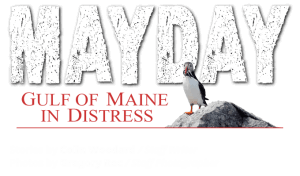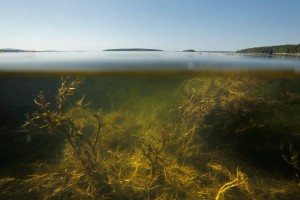Last Friday the Portland Press Herald released the final instalment in its six-part series entitled Mayday: Gulf of Maine in Distress by staff writer Colin Woodard and staff photographer Gregory Rec. The series is well written, well researched, includes powerful images, and clearly lays out the extent of the threats facing our coastal waters.

The series opened by explaining just why the Gulf of Maine and the Bay of Fundy is so special, and important. Woodard explores how geography, ocean currents, rivers, and regional temperatures have worked together to produce a highly productive cold water ecosystem which has sustained coastal residents for thousands of years. The opening piece then goes on to lay out how aspects of this delicate balance are breaking down due to the effects of climate change. The cold water currents that feed the system are not as predictable as they once were; big rains lead to big runoffs of “tea-coloured” water from rivers that starve important marine plants of sunlight; and puffins, whales, and other animals have not been able to find the food they have relied on for eons.

The series goes on to look in more detail at how changes in the food web are making our coastal waters a less predictable source of food for whales, puffins and other seabirds; how many species are retreating to deeper (and more northern) waters in search of the cool conditions they need; how invasive species are changing the ecosystem (sometimes to disastrous effect); and how ocean acidification is already affecting many shell producing species in the Gulf. The last segment in the series suggests that Maine is not doing enough to address the scale of the threat facing the Gulf of Maine and those who rely on it. It is safe to extrapolate that there is much more New Brunswick, Nova Scotia and the Canadian federal government could be doing as well.
It is impressive to see the many scientists, fishers, shellfish growers, and advocates who are doing important research and taking action to protect their coastal waters.
Unfortunately, part of the story is how hard Woodard found it to access Canadian Government Scientists, waiting two months in one case to get permission to speak with one scientist while others were simply not allowed to discuss their research with him. To contact US government scientists, Woodard would only have to pick up the phone and would usually get an interview the same day. Woodard gave an interview to CBC Radio’s Shift outlining the challenges he faced getting access to Canadian Scientists for the story.
This series is not the first set of journalism to look at climate change impacts in the Gulf of Maine, but its comprehensive treatment of the issue as well as its clarity help communicate the scale and scope of the problem far and wide. At CCNB we’ve been working to protect the Bay of Fundy for decades because, like Woodard and the many scientists, fishers, shellfish farmers, and coastal residents he interviewed, we know that productive coastal regions like the Bay of Fundy and Gulf of Maine are more important than ever in an ocean that is changing fast in the face of climate change.
We know that our Bay of Fundy is changing; if we take care of it and treat it right it will have a much better chance at achieving a new balance, of being resilient. With sound decision-making and a lot of hard work we hope we can pass a productive and vibrant, if changed, ecosystem onto our children and grandchildren. This is no small task. This is why we worked hard with many others to see the St Croix River re-opened to one of the largest runs of gaspereau (alewives) on the eastern seaboard (a fish that serves as key food for everything from whales to cod and pollock to seabirds); it’s why we are so concerned about pesticide use in the salmon aquaculture industry (which poses risk to lobster and the many small animals that live in the top of the water and are at the base of the food chain); and it’s why we have raised concern about the proposed Energy East pipeline which will increase oil spill risks, especially of highly toxic bitumen, and increase noise that adds a great deal of stress to our already struggling whale populations.
We have not given up on our Bay, we will not give up on our Bay. Join the Conservation Council or become one of our monthly donors to help us continue our work to protect this precious ecosystem, together.

